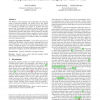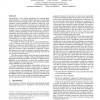286 search results - page 50 / 58 » Pitfalls in Formal Reasoning about Security Protocols |
117
click to vote
CSFW
2010
IEEE
15 years 5 months ago
2010
IEEE
—Although policy compliance testing is generally treated as a binary decision problem, the evidence gathered during the trust management process can actually be used to examine t...
110
click to vote
CORR
2008
Springer
15 years 1 months ago
2008
Springer
The Windows Vista operating system implements an interesting model of multi-level integrity. We observe that in this model, trusted code must participate in any information-flow a...
104
click to vote
PLDI
2006
ACM
15 years 7 months ago
2006
ACM
Type systems for secure information flow are useful for efficiently checking that programs have secure information flow. They are, however, conservative, so that they often rej...
137
click to vote
STOC
2009
ACM
16 years 2 months ago
2009
ACM
We study the question of basing symmetric key cryptography on weak secrets. In this setting, Alice and Bob share an n-bit secret W, which might not be uniformly random, but the ad...
147
click to vote
PLDI
2012
ACM
13 years 3 months ago
2012
ACM
Linearizability is a key design methodology for reasoning about tations of concurrent abstract data types in both shared memory and message passing systems. It provides the illusi...


